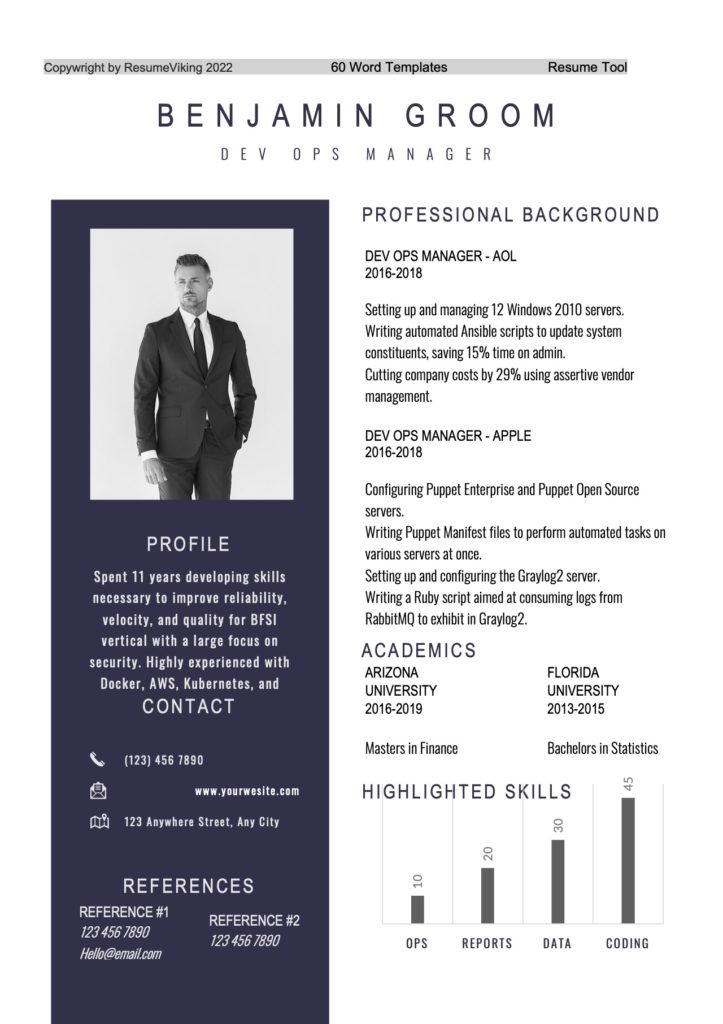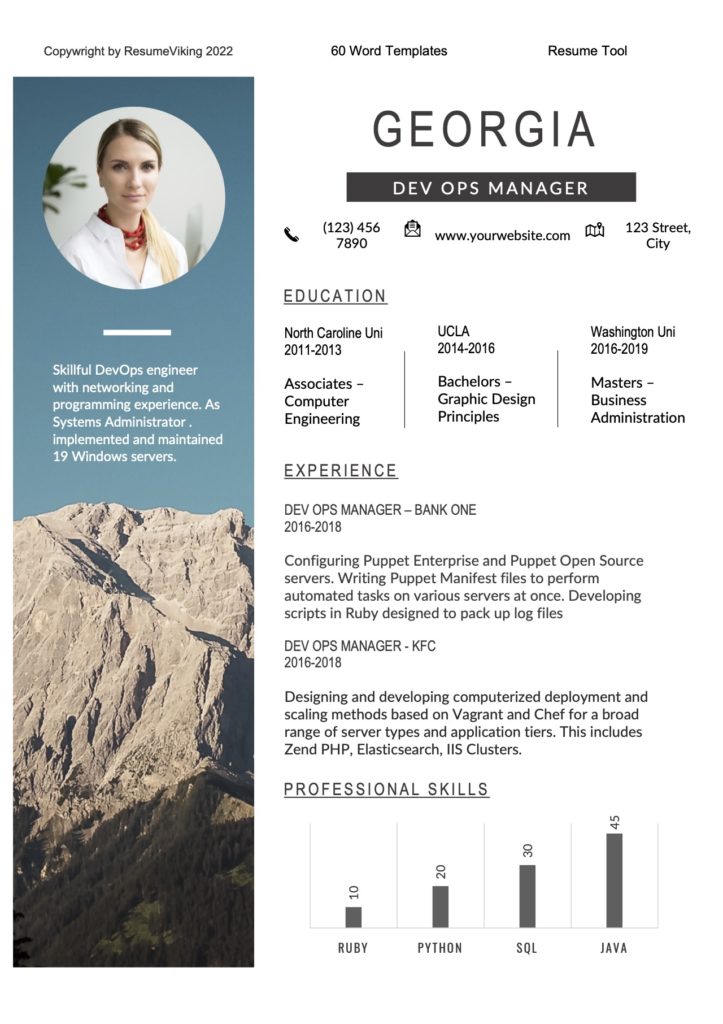



















In the end, a Senior DevOps deals with the organization’s trickiest technical problems and pushes technical excellence in every level of work, collaborating with senior management to assist the execution of the organization's vision. The DevOps Manager truly cares about the technical side of operations, ensuring that everything performs at optimum levels for web applications.
Step one: Prove to the hiring managers you’re the perfect applicant:
Step two: recruiters look for people who have a deep knowledge of various monitoring solutions (server and web applications). They must also understand New Relic well and be able to set these tools up and configure and use them to locate probable gaps and stop them from happening.
Recruiters want a DevOps Manager who is efficient at managing service delivery, and website/systems and scalability will be responsible for all parts of deployment and technical operations. This means you must pay particular attention to your coordination, facilitation, and project management skills in your resume.
Step three: Highlight your ability to swap from tech genius to communication godfather. You have to be great at eliminating jargon when talking to the development team but still bringing across the tech details in depth.
They will also want to be confident in your ability to take complete control of all projects’ technical implementation and guarantee that you will do everything in your power to eliminate risks.
You mustn’t forget to highlight that you are learning continuously by keeping up to date with all the new tech stuff and evaluating how it may affect their company.
Lastly, showcase that you’re willing to leave the management part from pure operations. You also want to show that you aren’t scared to get down and dirty, diving deep into technical details when needed.
Recruiters spend about 7 seconds scanning each resume they receive. So how will you catch their eye? By writing a brilliant career summary or career objective. It may be one of the components that put your resume in the YES pile.
Let's start with resume summaries:
Ladies and gents, we can’t stress enough how important it is that you mold each career summary or career objective to every job you apply for. This sounds like more effort, and it sort of is, but the rewards will make sense if you think of it as quality over quantity. Tailoring your career summary may result in fewer application attempts from your side due to the way your resume is written up, ending in more interviews.
The thing that distinguishes a Career Summary from a Career Objective is TIME. The summary highlights what you have already done. Objectives Explain what you intend to do.
The format should look something like this:
Note: your career summary, and resume, must be written in the third person. Forego the me, myself, and Is.
Now onto objectives:
Career objectives must have your ambitions and goals. Why do you want to work for that specific company, and how do you plan to add value to their team? When you answer these questions, put in any core skills or experiences that highlight why you’ll be invaluable in that particular job.
If you’re an entry-level DevOps, don’t stress. Your resume must include a career objective telling the recruiter about your career ambitions and the value you’re going to add to the team. Citing school projects and jobs you did for neighbors and friends etc., as well as any volunteer work, all counts as job experience in your DevOps resume. If you have any awards, you’ve won in high school or university, or any published work, add a link so the recruiters can see them.
“Spent 11 years developing skills necessary to improve reliability, velocity, and quality for BFSI vertical with a large focus on security. Highly experienced with Docker, AWS, Kubernetes, and Openstack, assisting organizations to instill DevOps for the modern age.”
“Adaptable DevOps manager with 4+ years’ experience. Aiming to use proven continuous deployment skills to increase quality at Google. Slashed customer complaints by 80% for a SaaS application. At (Insert Company Name)., I utilized Jenkins and AWS tools to reduce release times by 10%. Increased customer satisfaction by 29%.”
“Skillful DevOps engineer with networking and programming experience. As Systems Administrator at (Insert Company Name), implemented and maintained 19 Windows servers. Developed scripts to program system updates. Worked closely with vendors to reduce company costs by 15%.”
This is the make-or-break section in your resume. In this section, you must stick to concise, professional sentences and explanations when describing your daily responsibilities.
The best layout to use here would be the reverse chronological order format. You must list your employment length, job title, name of the company, and then a bullet list of job obligations:
(January 2016 – Current)
Responsible for designing and developing computerized deployment and scaling methods based on Vagrant and Chef for a broad range of server types and application tiers. This includes Zend PHP, Elasticsearch, IIS Clusters.
(January 2011 – November 2013)
Tasked with the primary purpose of maintaining SVN repositories for DevOps environment: automation code and configuration.
The recruiter needs to be guided to think you are the one and only choice for the job. Simply put, modify your resume by choosing from the relevant duties from our examples below and add your accomplishments. This will put you in the best position to get hired.
DevOps Managers understand the term “proof of concept.” The accomplishment section of your resume is very similar to this concept.
Take all the skills you have and explain them using power verbs and numerical values that link to your statements about the awards and achievements/ projects you’re most proud of.
Creative brains don’t always do facts and figures, but the accomplishment section needs accurate data for the recruiters to look at regarding your career achievements. This is your self-promotion section where you sell yourself as a unique brand. Add a little oomph by including links to your website, Instagram, and/or Pinterest.
The temptation to skimp on this section is real, but please don’t. Being able to quantify your achievements is critical.
So, let’s first have a look at what NOT to do.
Any flat statements simply rephrasing your job responsibilities or using words like increased, excellent, delivered, and reduced don’t mean jack if you don’t put in some metrics to back it up. For example:
Now we are going to quantify them. Better right?
This section is incredibly important! It matters, and if it didn’t, then any random person could do your job. Lay it out like this:
If you have any certifications, add them to your resume in this section. List: Date, Degree, College Name, and Location to keep your credentials easy to read:
See below for some examples:
2009–2013- MS in Computer Science. University of Michigan, M.
2013 – 2015- Bachelor of Science in Computer Information Systems. Northwest Vermont University.
It’s imperative to focus on your core skills and capabilities that are relevant to the job being offered. This is how you do it:
Using a technical skills matrix achieves two essential goals:
A DevOps also needs interpersonal skills as there is much collaboration with colleagues and other employees. Make sure to list these soft skills as they give the recruiters a good idea if you fit into their company. These skills are normally listed at the end of the job ad, so read it carefully and mimic the ad's stated soft skills on your resume.
We are going to need to mix it up here. We know you like your bullet lists, but can we not please? It’s so old-school. Use the skills matrix below:
| Soft Skills | Technical Skills |
| Collaboration skills | Operating systems |
| Communication skills | Unix/Linx |
| Problem-solving | Network protocols |
| Creative thinking | GIT |
| Adaptability | Build and release |
| Critical thinking | Jenkins |
| Active learning | Source control |
| Perceptiveness | Puppet/ chef |
| Leadership skills | Deployment |
| Interpersonal skills | Salt/ ansible |
| AWS DevOps Certifications | Red Hat DevOps Certifications | DevOps Institute Certifications |
| AWS Certified DevOps Engineer | AWS Certified SysOps Administrator | Docker Certified Associate |
| Certified Kubernetes Administrator (CKA) | Puppet Certified Professional | Bachelor’s Degree in Computer Sciences |
Your resume must basically show that you're not a robot, so add other sections that prove your worth as a person. No cheesy nonsense like “long walks on the beach” type stuff. This isn’t a dating profile.
Below are examples of what you could add in an optional section.
2016- DevOps Days, was a speaker on the panel about serverless networks.
2019- Article on containers appeared in “The Agile Admin.”
2016- Article on observing best practices, which featured in “DevOpsGuys.”
Professional Information on DevOps
Sectors: All industries
Career Type: Technical, Operations, Information Technology, Software, Hardware, Architecture, Configuration Management, Continuous Integration, Automated Testing, Infrastructure,
Person type: Manager, Developer, Coordinator, Facilitator. Developer, Integrator, Monitor
Education levels: Post school and upwards
Salary indication: $112 907 per annum (Glassdoor)
Labor market: 6% growth between 2018 and 2028 (Zippia)
Organizations: Various

